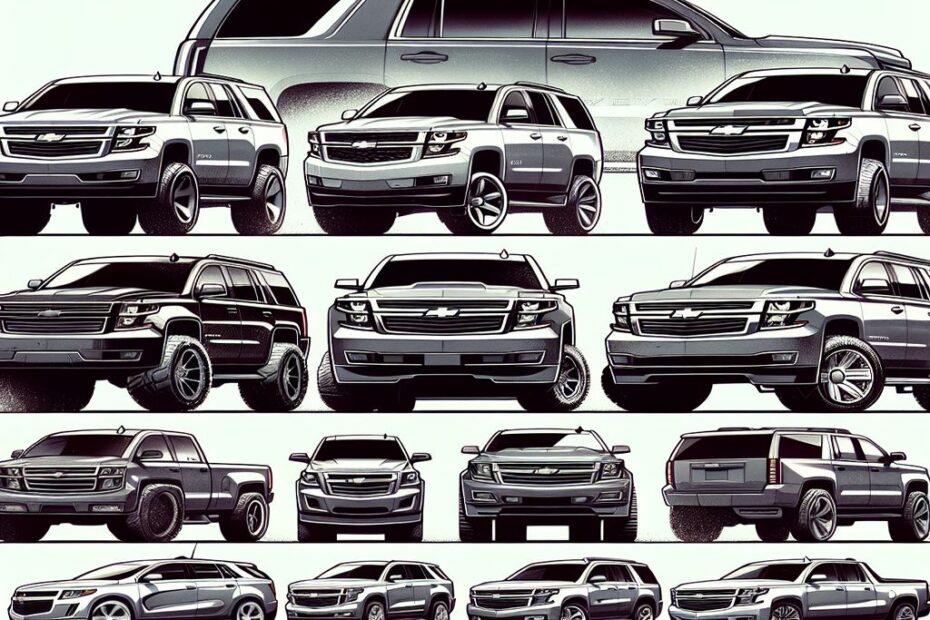Introduction
Chevrolet, affectionately known as Chevy, has a rich history in the SUV market, offering a diverse lineup catering to various consumer needs. From compact crossovers to full-size SUVs, Chevy provides options for a wide range of preferences and lifestyles.
Brief History of Chevy SUVs
Chevy’s SUV journey spans decades, showcasing innovation and evolution in design, technology, and performance. The brand’s commitment to meeting consumer needs is evident in its diverse SUV models, from utilitarian beginnings to today’s refined vehicles.
Importance of Ranking Chevy SUV Models from Smallest to Largest
Categorizing Chevy SUVs by size empowers consumers to make informed decisions based on their specific requirements. Understanding the differences in size, features, and capabilities helps buyers prioritize factors like seating capacity, cargo space, fuel efficiency, and driving dynamics for a tailored choice.
Chevy Trax
Description of the Smallest Chevy SUV
The Chevy Trax, Chevy’s compact crossover, is ideal for urban adventures with its small footprint and versatile design for city driving and weekend getaways.
Key Features and Specifications
- Engine: A balance of performance and economy for city driving.
- Interior: Thoughtfully designed for passenger comfort despite its compact size.
- Technology: Seamless integration of infotainment features for a modern driving experience.
- Safety: Advanced safety systems for peace of mind on the road.
Pros and Cons
Pros:
– Maneuverability in tight spaces.
– Fuel efficiency for city driving.
– Comfortable interior despite its size.
Cons:
– Limited cargo space.
– Modest acceleration on highways.
– Small size may not suit all consumers.
Chevy Equinox
Description of the Second Smallest Chevy SUV
The Chevy Equinox offers a blend of practicality, comfort, and performance, appealing to a broad range of consumers between the compact Trax and mid-sized Blazer.
Key Features and Specifications
- Engine Options: Versatile choices for power and efficiency.
- Interior Versatility: Configurable seating and ample cargo space.
- Technology Suite: Integrated infotainment and connectivity features.
- Safety Enhancements: Advanced safety technologies prioritize passenger protection.
Pros and Cons
Pros:
– Versatile interior with ample cargo space.
– Comfortable ride quality for daily commuting.
– Diverse engine options for varied preferences.
Cons:
– Some cabin materials may feel less premium.
– Rear visibility could be improved.
– Infotainment interface may have a learning curve.
Chevy Blazer
Description of the Mid-Sized Chevy SUV
The Chevy Blazer offers style, performance, and capability in a mid-sized package, catering to consumers seeking a balance of space and agility.
Key Features and Specifications
- Design: Bold exterior design for a confident presence on the road.
- Performance: Potent engine options for a dynamic driving experience.
- Interior Comfort: Spacious seating and premium materials prioritize passenger comfort.
- Technology Integration: Cutting-edge tech features for modern preferences.
Pros and Cons
Pros:
– Striking exterior design that commands attention.
– Strong performance capabilities for versatile driving.
– Well-appointed interior with premium touches.
Cons:
– Fuel efficiency may vary based on engine choice.
– Limited cargo space for larger items.
– Firm ride quality on rough roads.
Chevy Traverse
Description of the Largest Chevy SUV
The Chevy Traverse, Chevy’s flagship SUV, offers spaciousness, comfort, and versatility in a full-size package, ideal for large families and cargo.
Key Features and Specifications
- Seating Capacity: Accommodates up to eight passengers comfortably.
- Cargo Space: Ample capacity for luggage, gear, and groceries.
- Comfort Features: Premium amenities enhance the driving experience.
- Safety Technologies: Advanced safety features prioritize passenger protection.
Pros and Cons
Pros:
– Spacious interior with generous seating and cargo capacity.
– Comfortable ride quality for long journeys.
– Comprehensive safety features for enhanced protection.
Cons:
– Larger size may pose challenges in urban environments.
– Lower fuel efficiency compared to smaller SUVs.
– Maneuverability impacted by size in tight spaces.
In the following sections, we will delve deeper into each Chevy SUV model, providing insights to aid your decision-making process. From performance comparisons to customer reviews, this guide aims to empower you to choose the ideal Chevy SUV that aligns with your preferences and lifestyle. Stay tuned for a comprehensive exploration of Chevy’s SUV lineup.
